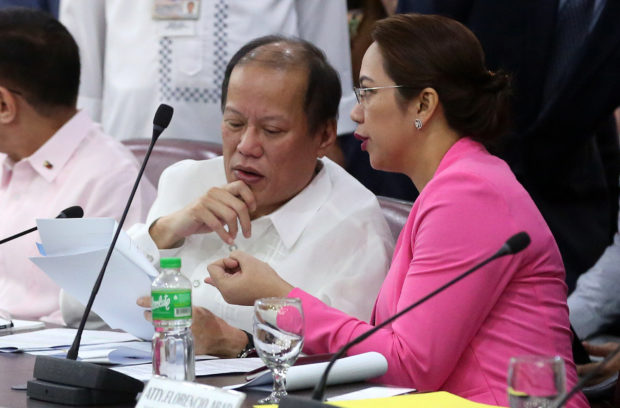
VACCINE PROBE Former President Benigno Aquino III and former Health Secretary Janette Garin testify on the purchase of Dengvaxia vaccines during a joint investigation of the House committees on good government and health. —NIÑO JESUS ORBETA
Former President Benigno Aquino III on Monday said he would not have approved a mass immunization program in 2015 using Dengvaxia had Sanofi Pasteur, the French pharmaceutical company that developed the dengue vaccine, made known then that the drug posed risks to the health of some people.
House probe
Facing the good government and health committees of the House of Representatives, which are inquiring into the Dengvaxia controversy, Aquino said he had no way of knowing in 2015 of the risks posed by the vaccine on seronegative recipients, or people who had no previous exposure to the dengue virus.
The Department of Health launched the P3.5-billion immunization program in April 2016.
Sanofi Pasteur announced on Nov. 29, 2017, that Dengvaxia worsened symptoms in vaccinated people who had not been ill of dengue before.
“It seems what we know now is the very opposite of what they said at the start, and I want to know why,” Aquino said.
“If the reason was bad and I were still in charge, well, on that suspicion, on the contradictory answers, I would have stopped it because it seemed contrary to the supposed decadeslong studies and results shown,” he said.
Nela Charade Puno, director general of the Food and Drug Administration (FDA), and Dr. Anthony Leachon told the hearing that Sanofi Pasteur already knew the risks posed by Dengvaxia in 2015 and should have told the Philippine government.
Leachon pointed to a document submitted by Sanofi Pasteur to the FDA on Dec. 22, 2015, the day the regulator issued a certificate of product registration for the vaccine.
He said the document listed four identified risks for seronegative people: viscerotropism (acute dysfunction of the organs), neurotropism (related to the brain and the central nervous system), severe anaphylactic reaction and severe dengue.
“What is very repulsive is that they actually concealed the four identified risks. It should be written in the informed consent, so the mothers, the victims, are aware of the dangers,” Leachon said.
“You have here a problem of concealment of data, particularly on safety,” he said. “To me, this is a grave sin [against] the Filipino people, considering this is a program of the government.”
Singapore told
Puno said an FDA special task force’s review of Sanofi Pasteur’s papers showed the company informed regulators in Singapore of the vaccine’s risks.
Singapore allowed commercial sale of Dengvaxia in October 2016, 10 months later than the Philippines.
“It means they knew. They should have told the Philippine government on Dec. 22, 2015, that this should not be given to children who had not yet been ill of dengue,” Puno said.
But Thomas Triomphe, Sanofi Pasteur’s Asia-Pacific head, denied the company had definitive knowledge of the risks at the time of its application with the FDA.
Triomphe said that in 2015 and 2016, Sanofi Pasteur was merely communicating “potential risks to look for or . . . theoretical risks to look for.”
He maintained that Sanofi Pasteur confirmed the risks only last year and immediately issued a public warning afterward.
“There was no informed data before November 2017, when the findings were discovered and were immediately communicated,” Triomphe said.
Health Secretary Francisco Duque III ordered the immunization program halted last Dec. 1, after Sanofi Pasteur announced the risks.
By then, however, more than 830,000 schoolchildren had been vaccinated with Dengvaxia.
Aquino said he approved the immunization campaign in good faith.
“You can be measured for what information you have when you make your decision,” he said.